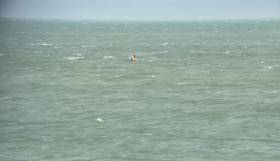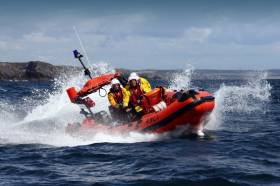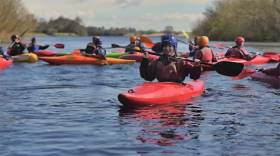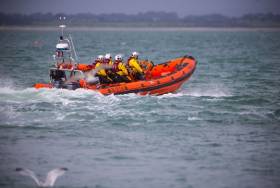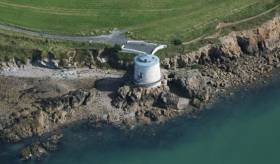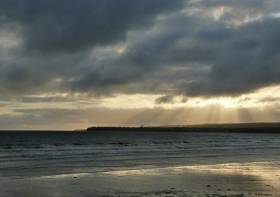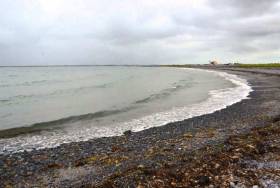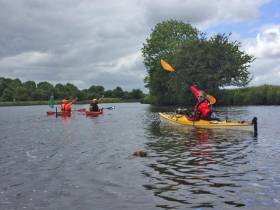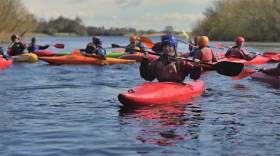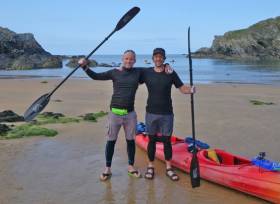Displaying items by tag: Kayaking
Howth Rescue Teams Launch To Lone Kayaker
#Rescue - Howth’s coastguard and lifeboat teams launched to the rescue of a lone kayaker off the North Dublin headland yesterday morning (Wednesday 28 September).
After a concerned onlooker called 999 when spotting that the kayaker was on the water with no life jacket, Howth Coast Guard and Howth RNLI’s inshore lifeboat were both tasked to the scene near Ireland’s Eye.
In the meantime the kayaker had proceeded around the back of the island and out of visibility from the caller on land. While the kayaker didn’t appear in difficulty, there were concerns for their safety.
A coastguard mobile unit proceeded to the end of the pier while the lifeboat launched on service to the far side of Ireland’s Eye, where the crew located a female on an open-deck kayak struggling in the water. She was brought back ashore by the lifeboat without incident.
“If she fell in the water, she had no means of staying afloat as she had no life jacket and only had a phone to call for help, there can be very limited if any phone signal once you go on the water,” according to an Irish Coast Guard spokesperson.
“The kayaker hadn’t checked the weather, which was unsuitable for the craft she was in. The lessons learnt are you need to have an emergency plan if going on the water – VHF radio, flares, whistle, weather information.
“Equally if not more important, you need a life jacket, no excuse.”
The rescue came just hours after Larne RNLI launched to assist two kayakers in difficulty off the Co Antrim coast, as previously reported on Afloat.ie.
Union Hall Lifeboat Brings 15 Kayakers To Safety Off Castlehaven
#RNLI - A group of kayakers were brought to safety on Thursday night (18 August) by Union Hall RNLI after they got into difficulty during a night-time kayaking expedition off Castlehaven in West Cork.
The alarm was raised by one of the kayakers after two of the party became separated and the group requested assistance to make their way back to shore.
Union Hall RNLI's inshore lifeboat was launched at 10.45pm and proceeded to the scene, where they learned that the two kayakers originally thought missing had made it to safety on shore and the rest of the group requested assistance to get back to land.
It was decided to take the group off their kayaks and bring them onto the lifeboat before bringing them the short distance to Reen Pier.
The 15 people were helped onboard the Atlantic 85 lifeboat while their kayaks were towed back to shore.
"This was a large group for our inshore lifeboat to assist and our volunteer crew did well in ensuring that everyone was taken onboard quickly and safely," said Union Hall RNLI lifeboat operations manager John Kelleher.
"The weather conditions were challenging for the lifeboat crew to get from their base in Union Hall over to Castlehaven but thankfully conditions on scene were much calmer.
"With the call for help coming in quite early and the lifeboat crew on scene quickly, we were able to get the situation under control in a short time with everyone accounted for and safely brought ashore."
Last Chance To Join In Blueway 10k Challenge This Weekend
#Blueway10k - Places are still open for experienced kayakers to sign up for this weekend's Blueway 10k Challenge, as the Nenagh Guardian reports.
Organised by Canoeing Ireland and the Canoe Association of Northern Ireland with Waterways Ireland, the nine events taking place simultaneously across the island this Saturday 20 August will see novice paddlers put their skills developed over the last 12 weeks of training to the test.
As previously reported on Afloat.ie, the initiative aims to take the hassle out of kayaking or canoeing on Ireland's inland waterways, showing that access to watersports is quicker and easier than many people think.
Three-time Irish Olympian Eoin Rheinisch gives an overview of the final week of training ahead of this weekend's challenge:
Helvick Head Lifeboat Joins Rescue Of Kayakers In Dungarvan Bay
#RNLI - Three kayakers who got into difficulty in Dungarvan Bay on Sunday evening (7 August) were assisted by the volunteer crew of Helvick Head RNLI.
The inshore lifeboat Robert Armstrong launched just after 6.30pm following a report that three people in kayaks were struggling in strong winds and currents in the Ballyvoile area of Dungarvan Bay.
One kayaker had made his way ashore but was stuck on rocks and was in need of medical assistance. He was airlifted by the Irish Coast Guard helicopter to Waterford Regional Hospital.
A second woman was helped from her kayak by the lifeboat crew and brought ashore at Clonea Beach close by. The third person was successful in reaching the shore.
The lifeboat, helmed by John Condon and with crew members Shane Walsh and Joe Foley onboard, later returned to the scene to recover a kayak from the rocks.
"Strong winds and the tide made it difficult for the casualties to get ashore and they were struggling," said Condon after the callout, "so the lifeboat was essential in ensuring the safe recovery of the second kayaker as well as in assisting the helicopter. We would like to wish all three kayakers well after their ordeal."
The incident came on the same day that a group of 12 kayakers was rescued in Dublin Bay after failing to heed the small craft warning in place due to forecast high winds, as previously reported on Afloat.ie.
#Rescue - Twelve kayakers rescued amid difficult weather conditions in Dublin Bay yesterday had only limited safety equipment and had not logged their trip with the coastguard, as The Irish Times reports.
The kayaking group were recovered by the Howth Coast Guard and lifeguards from nearby Dollymount after high winds and an outgoing tide started pushing them out into the bay off Red Rock in Sutton yesterday evening (Sunday 7 August).
It since emerged that the 12 paddlers had failed to observe the small craft warning issued ahead of yesterday's forecast high winds, on top of setting out without a marine VHF radio and failing to log their journey with the National Maritime Operations Centre.
Elsewhere, four people were rescued after a fire broke out on their cruiser on the River Shannon near Banagher in Co Offaly at the weekend.
According to The Irish Times, the four on board the White Lady raised the alarm on Saturday evening (6 August) after the fire started in the boat's engine system.
The skipper was able to motor the boat to Banagher Harbour where waiting fire service units brought the blaze under control.
Woman Rescued After Kayak Capsize In Liscannor Bay
#Rescue - BreakingNews.ie reports on the rescue of a woman whose kayak capsized in Liscannor Bay this morning (Sunday 24 July).
The woman – one of a group of four – was unable to get back into her kayak, prompting her fellow paddlers to raise the alarm.
Emergency services were notified but the woman was shortly after rescued by the crew of a nearby fishing vessel and given the all clear back at Liscannor Harbour.
The incident came just says after a father and son were rescued from Galway Bay further north after their kayak capsized, as previously reported on Afloat.ie.
Lifeguards Rescue Father & Son Kayakers In Co Galway
#Rescue - A father and son were rescued on Thursday (21 July) by Kinvara beach lifeguards after being washed overboard from their kayak.
Lifeguards Mark Buckley and Niall Hanley contacted the Irish Coast Guard shortly after 3pm when they became concerned about two kayakers who had set out earlier from Traught beach.
Valentia Coast Guard immediately launched a search operation, tasking Galway Bay RNLI, the Shannon-based coastguard helicopter Rescue 115 and the Doolin Coast Guard unit.
Less than one hour after the alert was raised, Rescue 115 located the casualties. They were then recovered by Galway Bay lifeboat, who confirmed that casualties were safe and well.
The coastguard watch officers on duty in Valentia were highly complementary of the two local lifeguards, highlighting their vigilance, timeliness of their report and for piecing together information on the casualties.
Galway Bay RNLI were also complimented for the successful rescue.
Charity Kayakers On Epic Shannon Paddle
#Kayaking - A trio of intrepid kayakers have reached Carrick-on-Shannon this afternoon (Thursday 16 June) on the second day of their long-distance charity paddle along length of the Shannon from Lough Erne to Killaloe.
Ger Harrington, Peter Brewitt and James Lynch hope to complete the 220km challenge by this Sunday 19 June in aid of the Irish Motor Neurone Disease Association, as the Clare Herald reports.
All three are experienced on the water, Harrington and Brewitt being longtime kayakers and Lynch being the first person to swim in the length of Lough Derg two years ago.
The team are posting regular updates on their journey on their Facebook page while raising funds for the charity that helped Harrington's late mother in her final months in 2012.
Paddle Your Way To The Blueway 10k This Summer
#Blueway10k - Blueway 10k aims to take all the hassle out of paddling activity whether kayaking or canoeing, allowing people quick and easy access to the water. It's a fantastic way to get fit, meet new people and learn great skills.
Earlier this month saw the launch of the Blueway 10k programme with all partners offering taster sessions on inland waterways around Ireland and Northern Ireland as part of the Blueway 10k National Open Day - some accommodating close to 100 participants for each session.
The Blueway 10k programme is based on a 12-week training programme from 30 May to 20 August with three hours of activity a week. Each canoe club or activity provider will provide you with the gear needed to take part.
For more on the event and registration visit the Blueways Ireland website HERE and get a step closer to #PaddlingYourWay to the #Blueway10K.
#Kayaking - Despite only learning how to swim last year, Manchester man Alan Creedon took up the challenge of paddling across the Irish Sea in honour of his late sister.
And this week he achieved just that, when he and his much more experienced kayaking partner Mike Alexander reached land at Dun Laoghaire by sea kayak after a 22-hour crossing from Holyhead.
According to The Irish Post, Creedon's journey actually began earlier this month when he set off on foot from his Manchester home for the North Wales ferry port – a journey of nearly 200km.
But the journey's not over yet, as Creedon's #WalkForAoife as he prepares to continue by foot across Ireland to Dingle, where his Irish family are based.
Along the way he'll continue to recount his experiences on his blog where he's also fundraising for a Dingle housing charity as well as mental health support.
In other kayaking news, island communities in West Cork are set to benefit from a kayak-sharing scheme modelled along the lines of bike-sharing in Irish cities.
As the Irish Examiner reports, Whiddy Island will host a test of the scheme next week before it's rolled out to Cape Clear, Long, Heir, Dursey and Sherkin Islands over the next three years.



























